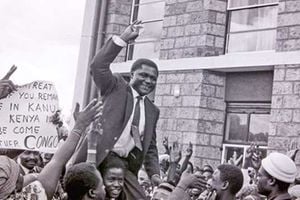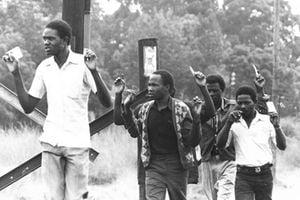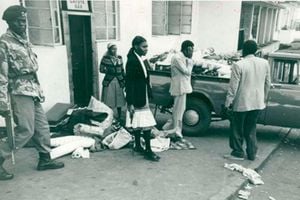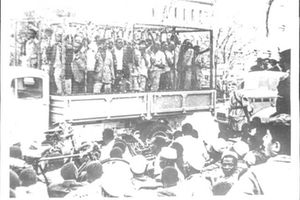-
Editions
-
ePaper
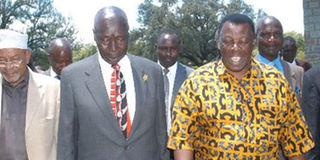
Je Huu Ni uungwana? How chance 1966 hotel visit birthed Leonard Mambo Mbotela’s famous show
Former president Daniel Arap Moi chats with former Presidential Service Unit staff Leonard Mambo Mbotela.
What you need to know:
- Je Huu Ni uungwana? Programme sought to create awareness on courtesy in public places, respect, honesty, common sense, and humane behaviour.
- Many listeners quickly fell in love with it because it touched on the issues that were part and parcel of their daily lives. Many people praised the programme and even sent in numerous issues that needed to be addressed.
One afternoon in 1966, barely two years after joining the VoK (Voice of Kenya), I was invited by a friend for a cup of tea at the Pan-Afric Hotel in Nairobi. He wanted to show me “where big men hang out.” I enjoyed sampling recreational places.
Thus, I gladly savoured the Pan-Afric atmosphere. While there, I saw a lot of dignitaries, including Attorney General Charles Njonjo.
However, the attention of every reveller was drawn to one patron who kept banging the table furiously and shouting impatiently, “Wapi waiter hapa! Wapi waiter hapa!” Many people turned around to look at him, but he kept shouting, adamantly.
I felt this was uncalled for because he could pass his message without attracting the attention of everybody. This patron had created a disturbance in an environment that was full of subtlety and civility. Many people were not happy with him. This behaviour had to be discouraged.
This incident kept ringing in my mind for several days. How can such people be educated to realise the need to respect others’ spaces? How could they be taught that their freedom ended where other people’s rights began? I then contemplated starting a radio programme that focused on educating the people on how to act with dignity and respect. I thought over it for several days.
About a week later, I took my idea to the Head of Kiswahili Programmes, Simeon Ndesanjo. He listened keenly and said, “I must say this is a good one. But you should do a sample so that we can evaluate its suitability for our listenership.”
I recorded three episodes and shared them with him. Simeon was happy with the content and format. He approved it immediately.
“This is very good… very good,” he said while nodding his head and walking around the studio. Being a young broadcaster, I was glad to receive such compliments from a veteran in the media. We then put our heads together and called the programme, Je, Huu ni Uungwana? It was agreed that it would go on air every Sunday from 12.45pm to 1pm for 15 minutes.
That’s how the Je, Huu ni Uungwana? program was born. It sought to create awareness on courtesy in public places, respect, honesty, common sense, and humane behaviour. Je, Huu ni Uungwana? became the most discussed programme. Owing to this popularity, Ndesanjo increased its airtime by 15 minutes and it began to run from 12.30pm to 1pm every Sunday.
After a while, when the public had fully understood what the programme was all about, I invited them to send in comments and suggest some of the issues that I could talk about. Many listeners quickly fell in love with it because it touched on the issues that were part and parcel of their daily lives. Many people praised the programme and even sent in numerous issues that needed to be addressed.
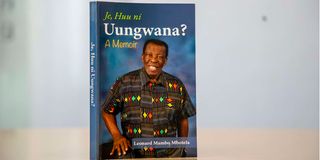
Leonard Mambo Mbotela’s book, ‘Je, Huu Ni Uungwana.’
The responses I received were overwhelming. People talked about the need to castigate discrimination at workplaces, tribalism, habitual drunkenness and general lack of courtesy and good manners such as jumping queues in banking halls and at other public places. Other social issues that were brought to my attention entailed teachers’ abuse of learners, wife battering, sibling rivalry, failure by parents to discipline children at home (poor parenting), among others. ..
I continued receiving a lot of messages from listeners. One day, someone came to the studio and asked to talk to me. He said he had an issue that he wanted to share with me. He told me of a young man who had got a very good job in Nairobi and had been fairly successful in life but never visited his parents back in thevillage. His father had written numerous letters asking for assistance but the young man never responded. So, one day, the father decided to pay him a visit in the city. When he arrived, the son was furious. He considered his father a huge nuisance.
He then told the father, “Niambie ulitumia pesa ngapi kunilea, kunilisha na kunisomesha ili nikulipe sasa hivi uwache kunisumbua.” (Tell me how much money you spent on raising, feeding, and putting me through school so that I refund you to make you stop bothering me.) The old man and some of the neighbours who witnessed this incident were shocked. The father, I was told, left immediately for the village. This story sounded stranger than fiction, but the one explaining it to me insisted that it truly happened before his very eyes.
I talked about this issue repeatedly in the programme “Je, Huu ni Uungwana?” I kept telling young people that the love and care that parents give us in childhood has no monetary value. I insisted that children should ensure they love and respect their parents at all times.
Through my interactions with the public, it became clear that the strength of a nation relies more on the character of its people rather than the material wealth they possess. That it is better to be poor and well behaved than to be rich and ill mannered. Sadly, many people focused more on building their economic foundations rather than social foundations.
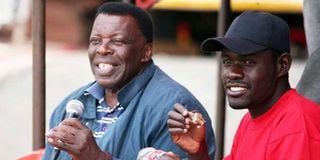
Veteran radio broadcaster Leonard Mambo Mbotela (left) and Christopher Kirwa of Coke during a past football match at Nyayo National Stadium, Nairobi. PHOTO | NATION MEDIA GROUP
Thus, most of the issues I talked about in this programme were aimed at creating a nation anchored on moral values; a nation that attaches more significance to courtesy and morality than riches. I strongly castigated the tendency to look at people from the perspective of “what they own” rather than “how they behave.”
Furthermore, it is unfortunate that many Kenyans are passionate about their tribal identities. The suspicion among tribes is real in our country. Many people look at others through tribal lens. Employment opportunities are only availed to those who belong to ‘our’ tribe irrespective of how incompetent those people are. Other worthy applicants are turned down for coming from the ‘wrong tribe’. The subject of tribalism elicited a lot of interest and was among the unpopular practices that I exposed to ridicule through the program Je, Huu ni Uungwana?
**
I was angry and I discouraged negative ethnicity in the strongest terms I could muster. As at 2022, Je Huu ni Uungwana had been on air for over 55 years.

